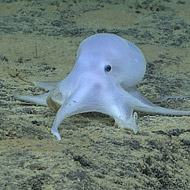‘Ghostlike’ octopus discovered near Hawaii

Casper, the 'remarkable little octopod’, was discovered around 2.5 miles off the coast of Necker Island.
A ‘ghostlike’ species of octopus has been discovered by scientists while exploring the Pacific Ocean floor near Hawaii.
On February 27, a team came across ‘a remarkable little octopod’, around 2.5 miles off the coast of Necker Island.
The appearance of the octopus was unlike any published records and was the deepest observation ever (4,000 meters) for this type of cephalopod.
Michael Vecchione from the National Oceanic and Atmospheric Administration said that the octopus falls into the incirrate octopod group, in that it did not have fins and all of its suckers were in one row on each arm.
“This animal was particularly unusual because it lacked the pigment cells, called chromatophores, typical of most cephalopods, and it did not seem very muscular,” he said.
“This resulted in a ghostlike appearance, leading to a comment on social media that it should be called Casper, like the friendly cartoon ghost.
“It is almost certainly an undescribed species and may not belong to any described genus.”
After seeing the octopus, Michael contacted his colleagues who agreed that the discovery is unusual and is a depth record for incite octopods.
They are now looking to combine this observation with some other deep incirrate observations by a German cruise in the eastern pacific into a manuscript for publication.



 The Veterinary Medicines Directorate (VMD) is inviting applications from veterinary students to attend a one-week extramural studies (EMS) placement in July 2026.
The Veterinary Medicines Directorate (VMD) is inviting applications from veterinary students to attend a one-week extramural studies (EMS) placement in July 2026.